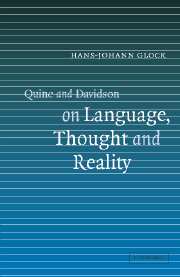Book contents
6 - Radical translation and radical interpretation
Published online by Cambridge University Press: 22 September 2009
Summary
Quine's term ‘radical translation’ refers to the translation of a completely unknown language with no historical or cultural links to familiar languages. Radical translation can neither assume any prior understanding of the language in question nor resort to a bilingual interpreter. Similarly, Davidson's ‘radical interpretation’ is the attempt to understand an alien community without the benefit of any prior knowledge of what its members think or of what their utterances mean. As a result of the work of Quine and Davidson, it is now commonplace to find philosophers discussing exotic anthropological scenarios, cases in which we encounter an isolated and completely alien tribe and try to understand its language and activities.
Quine's first explicit treatment of radical translation appeared in a collection entitled On Translation (1958). This may be responsible for Rorty's claim that Quine and Davidson develop ‘the philosophy of language of the field linguist’, on whose ‘mundane standpoint’ their whole philosophy is based (1986: 339). Other commentators have complained that radical translation and interpretation have little connection to the actual procedures field-linguists, anthropologists and archaeologists employ in interpreting unknown languages, practices or texts. One might also wonder how such a special phenomenon should come to be the focus of so much philosophical attention and the linchpin of two important philosophical systems. Why base one's philosophy on the standpoint of the field-linguist, and not on that of the priest, the physicist, the artist or the logician – to mention just a few figures that have inspired philosophers in the past?
- Type
- Chapter
- Information
- Quine and Davidson on Language, Thought and Reality , pp. 166 - 199Publisher: Cambridge University PressPrint publication year: 2003
- 1
- Cited by



